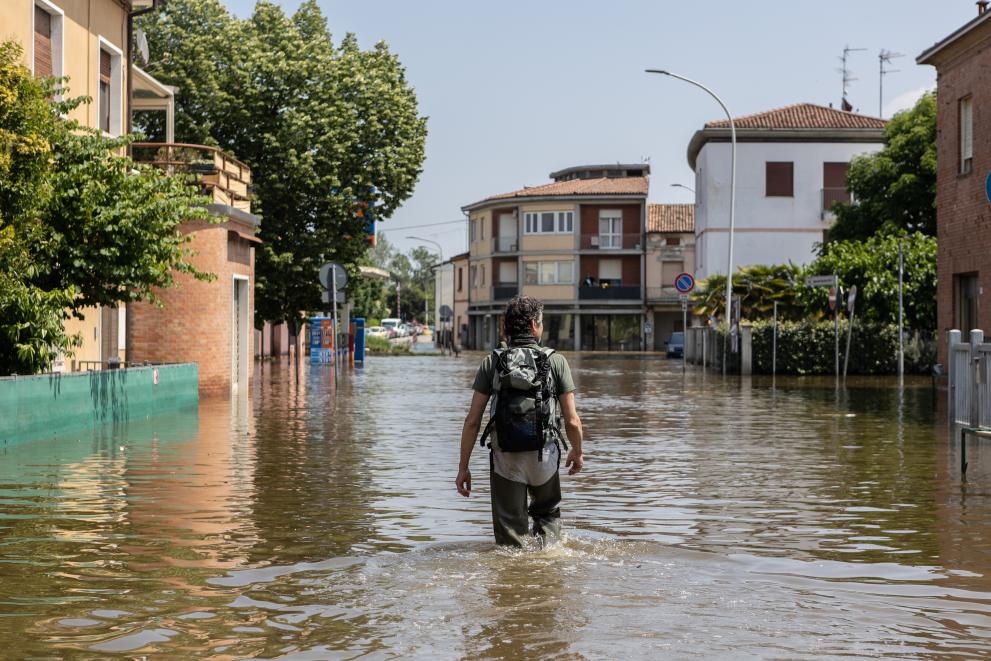
Where water is scarce, land dries up causing crop failure and people’s health is at risk from lack of drinking water. Since warmer air can hold more water, climate change is also leading to heavier rainfall and extreme floods in other areas. This claims lives, destroys homes and infrastructure, and puts a huge economic burden on our societies.
According to estimates, floods caused almost 5600 fatalities and more than €250 billion losses in EU countries between 1980 and 2021. In the aftermath of such flooding, higher water temperatures accelerate the growth of waterborne pathogens, which encourages the outbreak and proliferation of deadly diseases. And the negative effects do not end there, as 75% of those affected struggle with their mental health.
Given that around 170,000 people in Europe are exposed to flood risk annually, and that this number could grow to 480,000 by the end of the century due to climate change, the potential impact of flooding across our continent could be huge.
But solutions exist, and while national and local authorities take action to protect the lives, health and wellbeing of their citizens, the EU is supporting their efforts with measures to tackle the threats posed by water in a changing climate.
In Europe...
In Milan (Italy), the LIFE Metro Adapt project – winner of the 2023 LIFE Climate Award – provided local urban planners with guidelines to apply natural solutions to prevent flooding and its health implications. The guidelines were soon put into practice – for example, a public car park was retrofitted with a sustainable drainage system and a canal network was restored to increase water retention capacity.
In low-lying Rotterdam (Netherlands), the risk of flooding is particularly high. Here another EU-funded project is using natural solutions to protect local citizens. With the LIFE Urban Adapt initiative, the city has restored its river borders, created tidal parks along the banks, and installed rainwater storage systems. These will hold back excess water and allow it to drain gradually, preventing floods.
Meanwhile, in the southwest of the Netherlands, the LIFE Dutch Dune Revival project has restored some 190 hectares of dunes with the support of EU funding. As a result, people living in the area can now count on a natural defence against the risk of coastal flooding made worse by rising sea levels.
The LIFE NAdapta project is protecting people’s health across Navarra (Spain) by improving local water management systems. First, the risk of flooding is being reduced by restoring damaged river borders, creating early warning mechanisms and encouraging local authorities to develop flood protection plans. In parallel, water scarcity will be addressed by assessing the availability of water in the region and adapting water demand management plans accordingly. Also, local wastewater treatment plants will be upgraded to prevent contaminated liquids from leaking into rivers during heavy rainfall and floods.
…and beyond
Of course, floods and other water-related threats caused by climate change, such as waterborne diseases or water scarcity, are not just European issues. Water is essential for life, but it has turned into a potential health hazard in many parts of the globe.
This is why in March this year the United Nations held their first Water Conference in 46 years, gathering around 10,000 stakeholders to discuss solutions to the global water crisis. Its key outcome, the Water Action Agenda, gathered over 700 commitments from governments, private companies and NGOs to contribute towards the achievement of Sustainable Development Goal 6: “Ensure access to water and sanitation for all”. The EU pledged more than €1 billion to support transboundary action on water management and water-related scientific research.
And we are making good on our commitment, helping countries across the globe improve their access to freshwater, sanitation and hygiene services. We also assist countries and regions affected by severe floods, for example by supporting the local flood monitoring organisation in West Africa to boost their disaster management capacity or by offering humanitarian aid to Pakistan in the aftermath of the 2022 extreme floods.
Remembering climate victims
It’s essential to act, but it’s also important to remember what has already been lost. In the EU, we want to commemorate those whose lives have already been cut short by the climate crisis.
On the second anniversary of 2021 extreme flooding that hit Central and Western Europe with a death toll of more than two hundred people, 15 July was established as the EU Day for the Victims of the Global Climate Crisis. On this occasion, the Executive Vice President of the European Commission Frans Timmermans visited the flood sites across Belgium, Germany and the Netherlands to pay homage to the victims and discuss progress in reconstruction and resilience building to protect the region against similar extreme weather events in the future.
There is still a long way to go in Europe and globally before we are fully prepared to weather the storm and avert the various water crises triggered by climate change, but the EU remains committed to working in Europe and with partners around the globe to protect people's lives and health.
Details
- Publication date
- 3 August 2023
- Author
- Directorate-General for Climate Action



